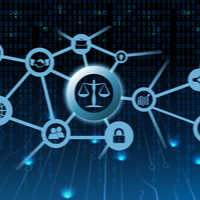Unrelenting pressure from the coronavirus pandemic has changed how many legal departments operate. With flattened staffing budgets and increased workloads, legal teams have turned to technology to solve these challenges with efficiency. Implementing the right legal tech stack aligned with company strategies and business goals has never been so important. Here are three of the major legal tech trends 2022 has spotlighted so far.
.png?width=611&name=shutterstock_1142347682%20(1).png)
Data Migration to the Cloud
Hosted cloud servers are nothing new, but despite being in use for over a decade, the legal market has been slow to migrate their data due to security concerns. Cloud-based legal applications are traditionally hosted on internal corporate servers and accessed by legacy applications on managed desktops. Cloud-based file storage system integration allows legal departments to fully operate in the cloud now, without having to worry about providing local server storage, granting virtual private network access, upgrading memory and processing power, or being able to provide untethered or mobile access to legal data.
On-premise data previously set the standard for information management; however, legal departments have increasingly found that cloud computing provides seamless remote access, significant time savings, collaboration opportunities, and long-term cost savings. Enhanced security and 99.9-percent uptime guarantees have assuaged many fears of the past. Cloud computing has freed lawyers to work from anywhere, and in doing so, it has enabled legal departments to adapt and scale their teams more effectively.
Blockchain
Blockchain technology has made countless headlines in recent years, primarily for its relation to Bitcoin—as the underlying tech allows for the virtual currency’s existence. From a legal perspective, blockchain provides a digital ledger of transactions that can be documented, distributed, and duplicated—but not edited.
Some legal departments struggling under the burden of excessive contract paperwork and historical records have integrated blockchain to store information in a transparent and precise fixed ledger rather than a centralized database. For many in the legal field, blockchain technology represents the “fourth industrial revolution” characterized by decentralized digital contracts that allow simultaneous real-time access, preserve modifications, and enhance distribution security.
Blockchain technology enables legal teams to:
- Digitally sign documents.
- Automate ownership transactions.
- Complete payments using cryptocurrency.
- Use digital wallets instead of escrow accounts for transactions.
- Ensure adherence to contract terms and agreements between multiple parties
LexCheck: Contract Review and Negotiation Powered by AI
Among legal tech trends in 2022, AI has transitioned from being considered a “new” technology to a necessary one. As a result of continued innovations in natural language processing and machine learning technologies, LexCheck’s contract review platform has enabled corporate legal teams to handle contract review and negotiation challenges without needing to add in-house staff or outsource legal services.
Legal departments that leverage AI from firms like LexCheck for contract review and negotiation can expect:
- Streamlined contract negotiation process offering near real-time delivery of actionable insights for contract revisions.
- Reliable attorney-quality markups, approvals, and exception escalations.
- Reduction of errors with automated corrections, fixes, and omission inserts.
- Diminished need to hire and train new entry-level legal team members.
- Recovery of time wasted negotiating boilerplate clauses in documents, allowing lawyers to focus on strategic, higher-value tasks.
While AI will not replace lawyers anytime soon, the technology is already dramatically altering how legal departments function. LexCheck’s contract negotiation platform uses machine learning to redline, review, and rewrite contracts in mere minutes.

.png?width=611&name=shutterstock_1142347682%20(1).png)